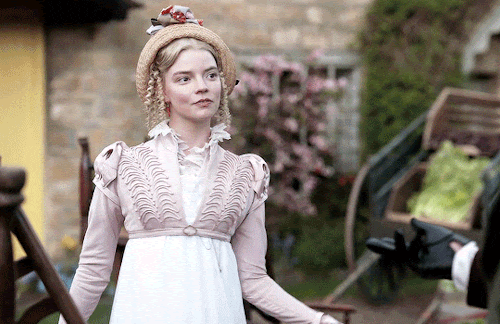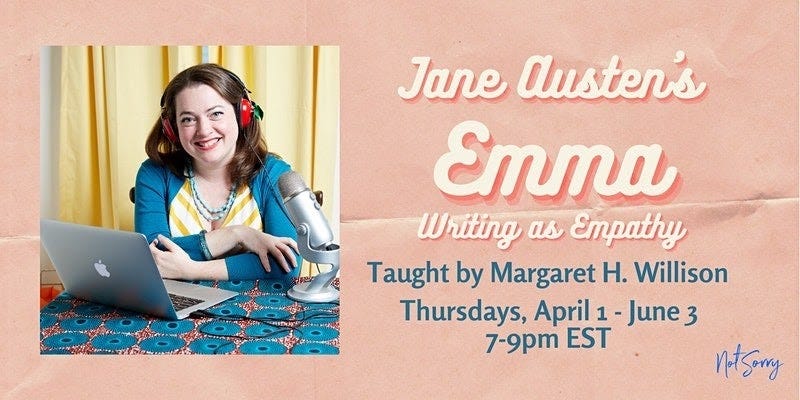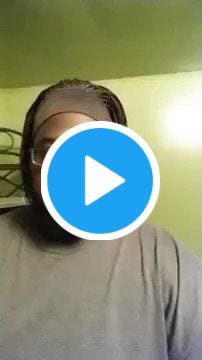Last Call & Flat Exhaustion
As we reach the one year mark on our period of involuntary house arrest, exhausted doesn’t even begin to cover it.
We are like… lying flat on our backs at the bottom of a muddy ditch, thinking fondly of the productivity we were able to summon a month or two ago when we at least still had fumes upon which to run. All of which is to say: we are going to be cutting back to an every other week publishing schedule for March, and likely April. We hate being less present in our Dames Nationals lives, but we are dangerously low on sparkle and clean out of verve. And we suspect, after this punishingly hard year, most of you will know exactly where we’re coming from.
Further Adventures in Damesing: Study Emma with Dame M
As we approach the one year mark for the COVID-19 pandemic, the effects of a small, restrictive life are weighing heavily on my mind and drawing me towards a close study of Jane Austen's Emma— Autumn de Wilde’s adaptation of which was, fittingly enough, the last movie I saw in theaters, 375 days ago. Thanks to the kind support of Not Sorry Productions, instead of rereading the book and excoriating myself over all the flaws Emma and I share all by myself, I can do it with a group of likeminded participants— maybe even YOU! Come and spend ten Thursdays with me reflecting on the ways life during a global pandemic is like life in a small English village when your hypochondriacal father artificially constricts your ability to travel. We will talk about the loss of perspective such seclusion creates by examining Emma herself and then work to grow our empathetic understanding of others by approaching the story from new fictional points of view. And, of course, we will be watching Clueless.
Bossy Spotlight: Elon Green and Last Call: A True Story of Love, Lust, and Murder in Queer New York
Thanks to a friendship forged in the fires of many, many successful Rick Rolls featuring a topless photo of Geraldo Rivera, We Your Dames were lucky enough to receive advance copies of Elon Green’s phenomenal new book, Last Call. Elon has used the serial murder of a number of gay men in New York in the late 80s and early 90s as a way to illuminate not “the mind of a killer” (yawn) but instead gay life in a transitional period, where homophobic violence and AIDS were simultaneously eating away at queer communities and radicalizing them. It’s a tender and compassionate story that captures both the individuals lost and the world they inhabited with profoundly evocative detail. Needless to say, we were eager to share the book with you, and eager to talk with Elon more about the process by which it came to be, hence: a Q&A with the illustrious Mr. Green.
We both have a complicated, frequently ambivalent relationship with true crime— we love mysteries and we love true stories, so in some ways we appear to be a natural fit for the genre, but there’s an element of… prurient rubbernecking that can often push us out of the story. How did you approach telling a story that centers on violence without letting it become one that gloried in that violence?
First, David Grann gave me some advice early on. He was reading a chapter in which, quite frankly, I’d probably overdone it on the gore. (I was working off a medical examiner’s court testimony, and it was extremely bloody.) This doesn’t need to be a CSI episode, he said. That was wise. But second, from beginning to end, the only audience I had in mind were the family and friends of the murdered men. Whenever I wrote something, I thought, How will they take this? Will this cause needless pain? There’s a particularly nasty line late in the book, and I kept it in only because the victim’s parents had both recently passed.
Ultimately, my feeling on violence is: one ought to tell the reader what is necessary to comprehend the magnitude of the crime, and no more.
What drew you to the subject of the Last Call killer, and more significantly, his victims? How did you learn about it and what were your starting points for research and reporting?
I wasn’t drawn to the murderer at all. In part, that’s because murderers are rarely interesting. And in part because when I first learned about the case, from a 1994 Advocate story, he hadn’t been identified. All I had were the victims. The first thing I did, at least after reading a few newspaper stories to get the contours of the case, was contact the Ocean County court stenographer. She was retired and skiing in Utah. When I got her on the phone, she said, “I have been waiting for years for a call like this.” She felt it was an extraordinary case and recalled it vividly. The trial transcripts provided the spine of the narrative.
After that, I started contacting and interviewing everyone mentioned during the trial, whether it was a sanitation worker who found a body or a major crimes detective.
One of the things we admired most about this book was the amount of information you were able to share about the day-to-day lives of the Last Call killer’s victims, their communities, and their characters— even ones whose lives evaded a lot of bureaucratic documentation, like Anthony Edward Marrero. What was your experience of gathering these stories like?
It was by far my favorite part of the reporting. The writing on the police investigation was mostly this happened and then this happened and then this happened. It was pretty well documented, either during the trial or in detectives’ notes. But reconstructing the life story of each man was a different, far more difficult project. Luckily, for three of the four New York victims, I had yearbooks and other ephemera to get me started. Classmates and friends were eager to talk. Family members, generally, were less so. It was enough to paint a picture.
The problem was Anthony, who was a sex worker from Philadelphia. I could find nothing about him. No yearbook. Nothing. A forensic genealogist tried to help and came up empty. A private detective who was intrigued by the request did some work gratis, but he, too, couldn’t find anything. It’s still my biggest frustration with the book.
The role queer activists and queer community building played in the story of the Last Call killer was extremely striking to us— the way that the killer’s violence was so closely tied to his victims’ marginalized place in society. Was that an element of the story you knew when you began your work, or was that a thread you uncovered as you researched it? How did pursuing it influence your understanding of the story?
The Anti-Violence Project came up a few times in news reports, enough to catch my attention. I’d never heard of AVP. The notion that an activist group was effectively prodding investigators and sometimes doing their own investigative work was a wild idea to me.
AVP was a part of the story from the beginning, and the further into the book I got, the more important it was to the narrative. I felt that readers had to be made aware of the city’s, and the country’s, rampant antiqueer violence. Without that awareness, how could they fathom the historical context for the story? In reporting and writing the AVP chapter, I began to really understand why four murders in three years didn’t make much of a ripple.
In somewhat serial-killer obsessed times, how do you think this story remained relatively unknown until you decided to write about it?
The murderer is basically a cipher, even now. Lots of people knew him, but no one, save for his first college roommate, knew him well. So he doesn’t have a personality that would grab headlines, in the manner of someone like Israel Keyes. Richard is just an otherwise unremarkable piece of shit who did evil things.
Was there any research you found that you found completely fascinating, but could not ultimately fit into the book that you’d like to share here?
I wrote thousands of words on the rise and fall of HX, which was a remarkable bar rag that chronicled New York City’s gay nightlife season. (There was a lesbian spinoff that no one read.) It was largely funded by pharmaceutical companies, and began to lose money after the development of the AIDS cocktail.
We Your Dames have both struggled to summon the focus for reading (or ANYTHING) during the pandemic, but we both found ourselves utterly absorbed by Last Call from the first pages— and if you don’t trust our taste, just ask The New York Times Book Review. We hope you seek out a copy at your local indie or library and love it as much as we have.
Two Bossy Dames is brought to you by:
We appreciate you, readers of Dames Nation!
Every time you tell a friend to subscribe, some woman, somewhere, is finally able to pre-register for her COVID vaccine shot!!!!!!
Help us build Dames Nation by upgrading to a paid subscription on Substack
Share your saucy opinions with us on Twitter whether jointly as your @twobossydames, or in single size servings as @MrsFridayNext & @sophiebiblio!
And! You can catch Bossy Extras on Tumblr.









